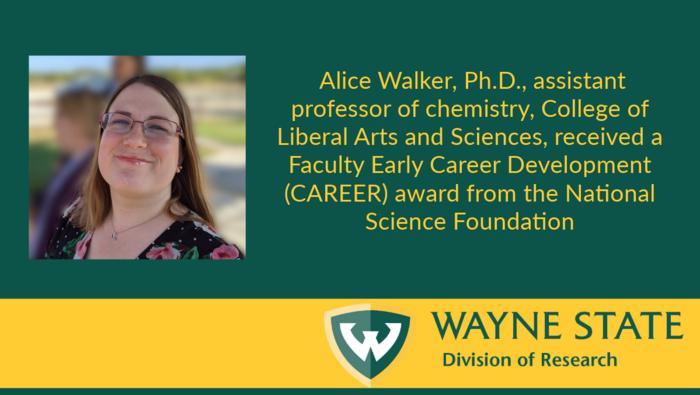DETROIT — Alice Walker, Ph.D., assistant professor of chemistry in the College of Liberal Arts and Sciences at Wayne State University, received a Faculty Early Career Development (CAREER) award from the National Science Foundation to fund her research on applying computational chemistry to the understanding and rational design of new fluorescent protein (FP) sensors.

Credit: Wayne State University
DETROIT — Alice Walker, Ph.D., assistant professor of chemistry in the College of Liberal Arts and Sciences at Wayne State University, received a Faculty Early Career Development (CAREER) award from the National Science Foundation to fund her research on applying computational chemistry to the understanding and rational design of new fluorescent protein (FP) sensors.
“A sensor, chemically speaking, is a molecule that turns on or off in response to certain stimuli,” said Walker. “Proteins are good sensors because they have a florescent element; they essentially glow in the dark in response to when it touches something. Florescent proteins have a well-known structure, but it’s not entirely clear how they function. Using a set of computational techniques, we can simulate a series of responses on the computer and see how that structure actually gets translated to a signal. If you know that, you can make new ones.”
The five-year, $690,816 grant will support her project, “Computational Design of Fluorescent Proteins with Multiscale Excited State QM/MM Methods.” Walker will use this funding to investigate the design of fluorescent protein sensors with computer simulations, using both quantum mechanics and classical physics.
“Making new ones is significant when it comes to the study of human health and disease,” said Walker. “We are particularly interested in how these things move and behave and thus how they can help with treatment. By creating new florescent protein sensors, you can track them in living cells and organisms. You can then use it to see if a drug is working by being able to tag cells with these sensors.”
The grant will partially be used to increase research experience opportunities for WSU students.
“Part of the NSF CAREER grant is outreach. It’s required as part of the grant,” said Walker. “WSU has a lot of students who are commuter students or people who can’t necessarily devote a lot of on-campus hours for research, so this grant also supports an undergraduate research course as an alternative to traditional daily research in a lab. This allows them to get access to research and computational resources without having to live on campus or frequent the lab in their off-campus time.”
“NSF CAREER awards are very prestigious for junior faculty to receive,” said Ezemenari Obasi, Ph.D., vice president for research at Wayne State University. “Dr. Walker is most deserving of this award for her impressive research that will undoubtedly have a tremendous impact on health assessment and beyond.”
The grant number for this National Science Foundation award is 2338804.
# # #
About Wayne State University
Wayne State University is one of the nation’s pre-eminent public research universities in an urban setting. Through its multidisciplinary approach to research and education, and its ongoing collaboration with government, industry and other institutions, the university seeks to enhance economic growth and improve the quality of life in the city of Detroit, state of Michigan and throughout the world. For more information about research at Wayne State University, visit research.wayne.edu.
Wayne State University’s research efforts are dedicated to a prosperity agenda that betters the lives of our students, supports our faculty in pushing the boundaries of knowledge and innovation further, and strengthens the bonds that interconnect Wayne State and our community. To learn more about Wayne State University’s prosperity agenda, visit president.wayne.edu/prosperity-agenda.




